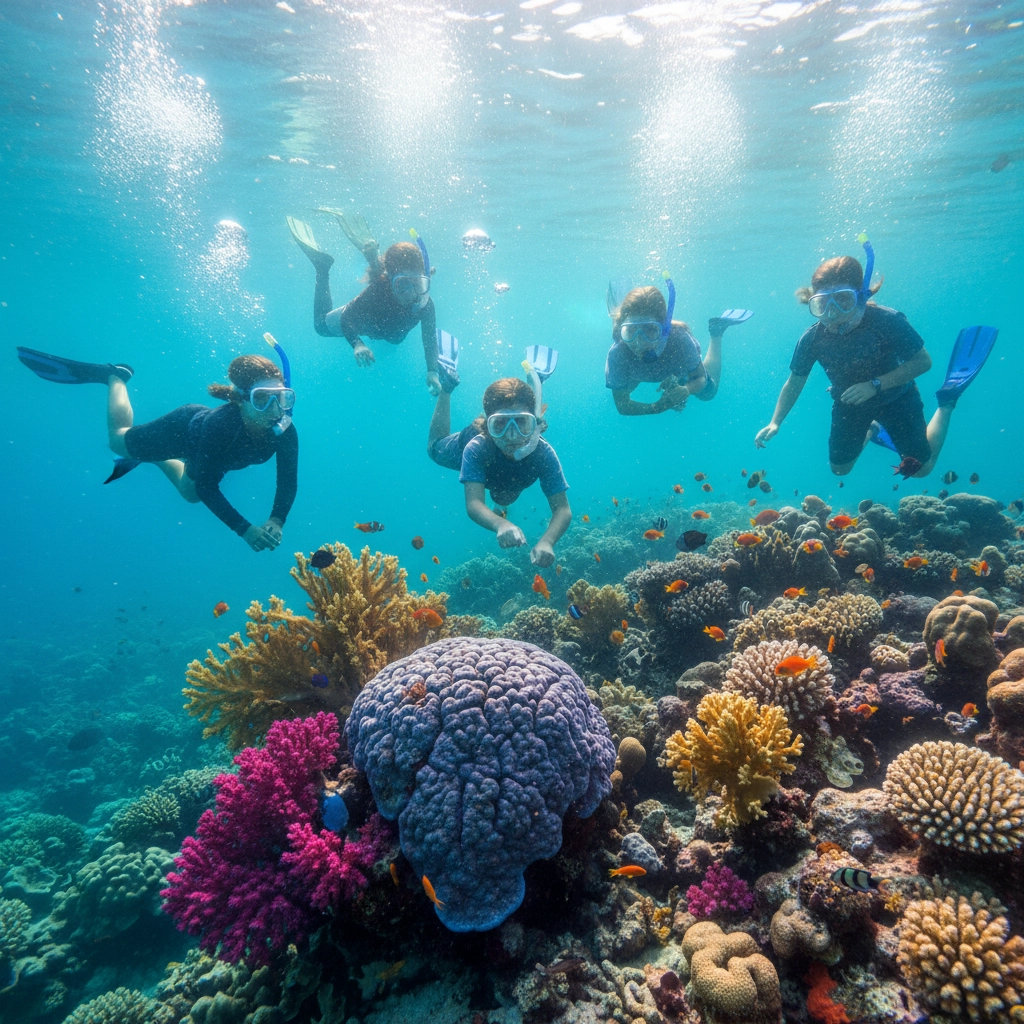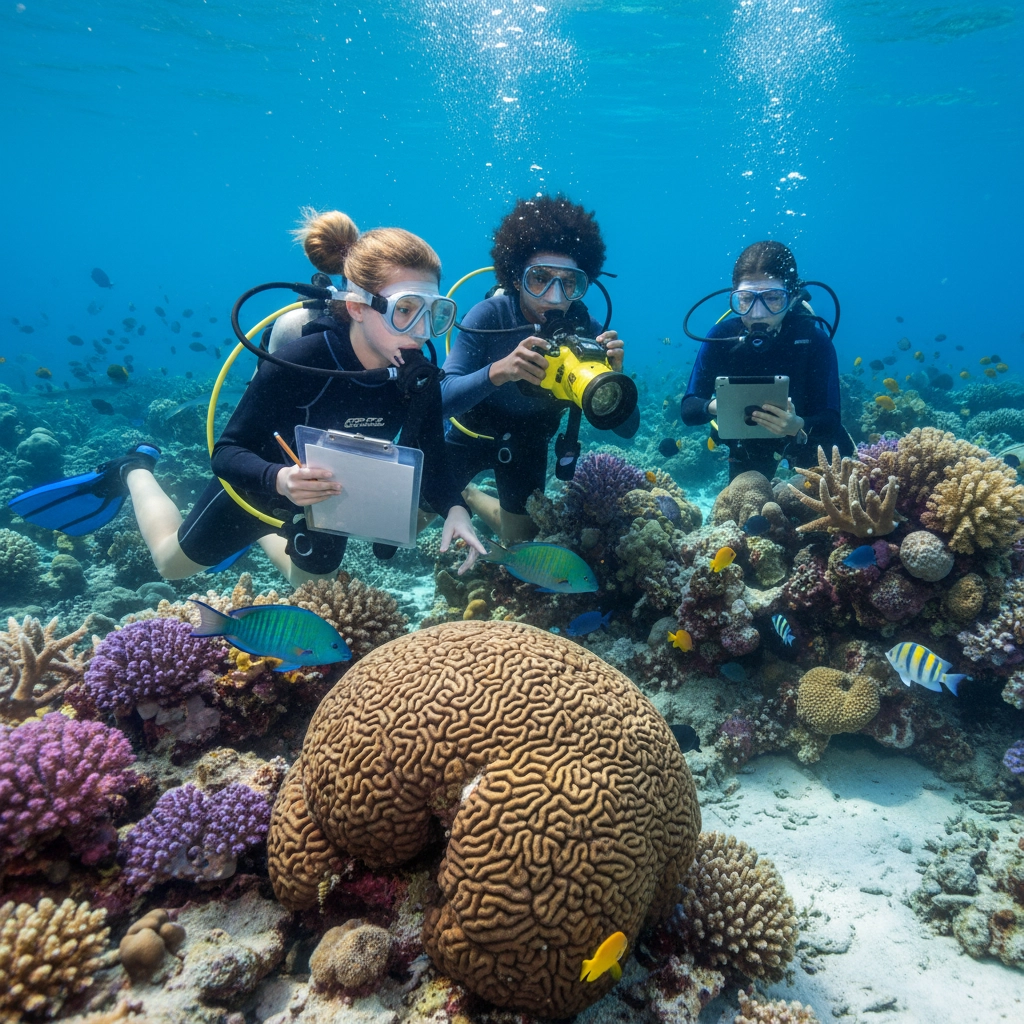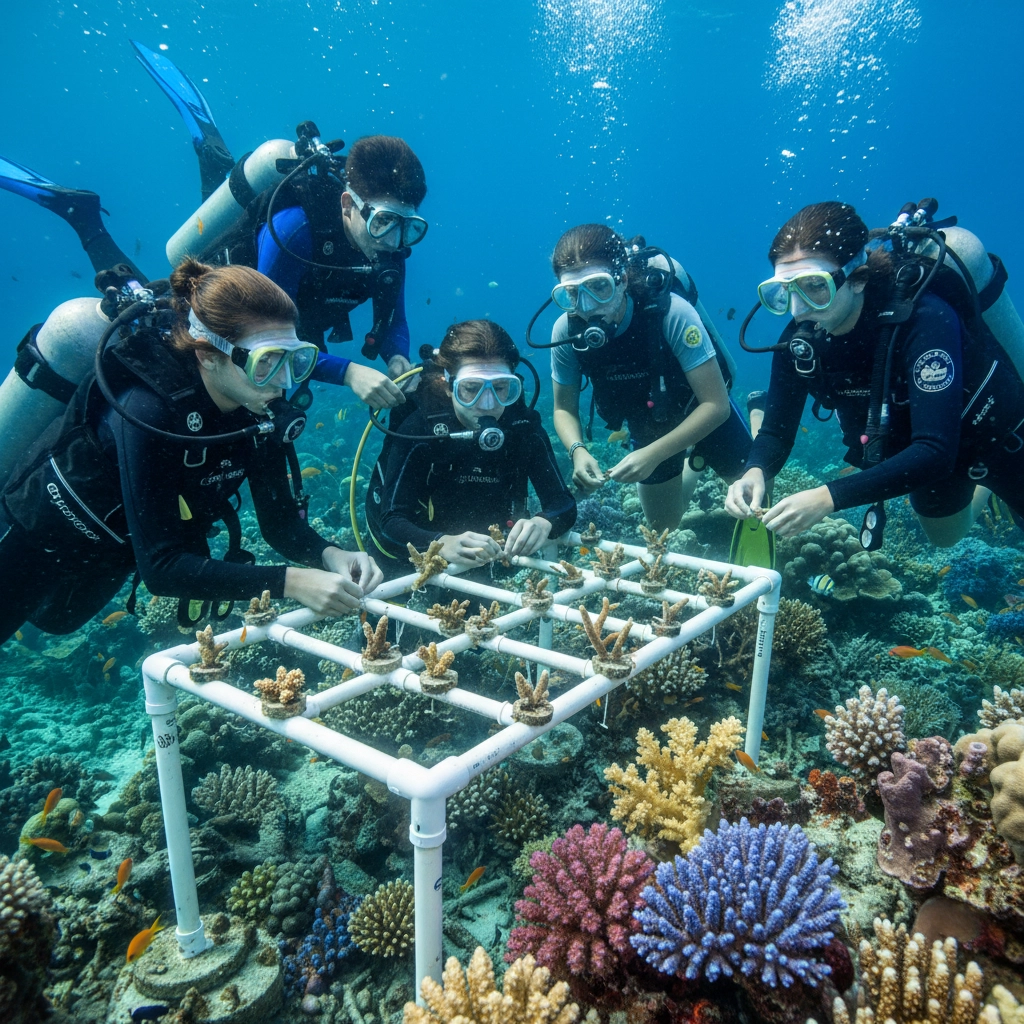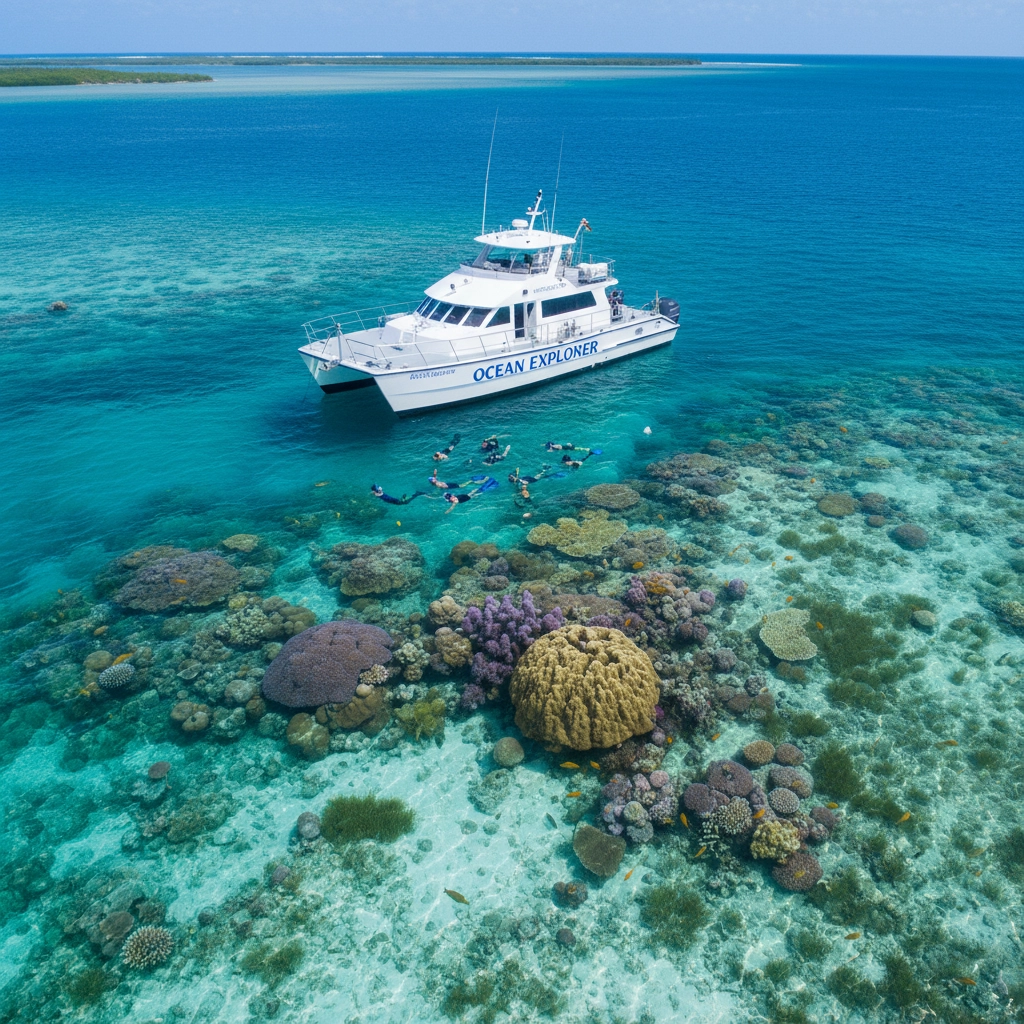Coral Reef Science in the Florida Keys: Middle School Classroom Meets Real Reefs
- Caleb Mullenix
- Oct 27, 2025
- 6 min read
Ensuring middle school students develop authentic connections to marine science requires more than textbook learning: it demands direct engagement with living coral ecosystems. The Florida Keys provide an unparalleled classroom where students transform from passive learners into active marine scientists through structured curriculum that bridges theoretical knowledge with hands-on reef exploration.
Preparing your students for meaningful coral reef science experiences involves careful planning that integrates classroom instruction with real-world snorkeling and restoration activities. This comprehensive approach ensures maximum learning outcomes while maintaining the highest safety standards for young marine scientists.
Pre-Trip Classroom Curriculum: Building Foundation Knowledge
Begin by establishing essential coral biology concepts before students enter the water. Effective pre-trip preparation includes four core instructional modules designed specifically for middle school comprehension levels.
Module 1: Coral Anatomy and Physiology
Examine coral polyp structure using microscopes and detailed diagrams
Investigate symbiotic relationships between coral and zooxanthellae algae
Analyze how corals obtain nutrition through both photosynthesis and feeding
Create detailed drawings of coral skeletal structures and soft tissues
Module 2: Reef Ecosystem Interactions
Map food webs within coral reef communities
Study predator-prey relationships among reef fish, invertebrates, and corals
Investigate how different coral species create habitat niches
Document ecosystem services provided by healthy coral reefs

Module 3: Environmental Threats and Human Impacts
Analyze water quality data showing effects of pollution on coral health
Examine case studies of coral bleaching events and recovery patterns
Research how climate change affects ocean temperature and pH levels
Evaluate human activities that contribute to reef degradation
Module 4: Coral Restoration Science
Study coral nursery techniques and transplantation methods
Examine genetic diversity strategies in restoration programs
Analyze success rates of different restoration approaches
Design hypothetical restoration projects for specific reef sites
Appleseed Expeditions provides comprehensive pre-trip curriculum packets aligned with Next Generation Science Standards, ensuring seamless integration with existing classroom instruction while building excitement for upcoming field experiences.
In-Water Learning Experiences: Real Reefs as Living Laboratories
Transform theoretical knowledge into practical understanding through structured snorkeling activities in Florida Keys National Marine Sanctuary. These experiences must prioritize safety while maximizing educational value through carefully designed underwater observation protocols.
Snorkeling Safety Protocols
Conduct comprehensive swimming ability assessments before departure
Provide professional-grade snorkeling equipment fitted for each student
Maintain strict 4:1 student-to-instructor ratios in all water activities
Establish clear underwater communication signals and emergency procedures
Ensure all activities occur in designated, protected reef areas
Structured Underwater Observations Students engage in guided scientific observations using waterproof data collection sheets:
Coral Species Identification: Document different coral types, growth forms, and health indicators
Fish Population Surveys: Count and identify reef fish species within designated transect areas
Water Quality Assessment: Measure visibility, temperature, and observe environmental conditions
Reef Health Documentation: Record signs of bleaching, disease, or physical damage
Restoration Site Visits: Observe coral nursery operations and transplanted coral colonies

Appleseed Expeditions partners with certified marine science educators and dive professionals who specialize in middle school instruction, ensuring age-appropriate activities that challenge students without overwhelming them.
Coral Biology Deep Dive: Hands-On Scientific Investigation
Create meaningful connections between classroom concepts and living coral systems through structured investigation activities. These experiences build scientific thinking skills while reinforcing core biological principles.
Coral Core Collection and Analysis
Examine coral skeletal samples to understand growth patterns and environmental history
Use magnifying equipment to study coral polyp structures and feeding mechanisms
Compare healthy coral samples with bleached or diseased specimens
Document observations using scientific illustration and photography techniques
Symbiosis Laboratory Activities
Observe zooxanthellae algae under microscopes using coral tissue samples
Conduct controlled experiments showing effects of temperature on algae survival
Analyze photosynthesis rates in healthy versus stressed coral samples
Create models demonstrating mutualistic relationships in coral ecosystems
Water Chemistry Investigations Students collect and analyze water samples from different reef sites:
Test pH levels and understand ocean acidification impacts
Measure dissolved oxygen concentrations in reef versus open water
Examine nutrient levels and their effects on coral health
Document temperature variations across reef zones and depths
These laboratory activities connect directly to snorkeling observations, creating comprehensive understanding of coral biology through multiple learning modalities.
Coral Restoration Science: Students as Marine Conservationists
Engage middle school students in authentic restoration science through partnerships with active coral restoration programs. These experiences demonstrate how scientific knowledge translates into conservation action.
Coral Nursery Operations
Observe professional coral nursery facilities and growing techniques
Participate in coral fragment collection and nursery preparation activities
Learn proper handling techniques for fragile coral specimens
Document coral growth rates and survival statistics over time
Transplantation Projects Students assist with age-appropriate restoration activities under professional supervision:
Site Preparation: Help clear debris and prepare reef substrate for coral transplantation
Coral Transport: Assist in moving nursery-grown corals to restoration sites
Data Collection: Record GPS coordinates, coral sizes, and environmental conditions
Monitoring Setup: Install identification tags and establish monitoring protocols

Genetic Diversity Studies
Learn how restoration programs maintain coral genetic diversity
Examine different coral genotypes and their survival characteristics
Understand breeding programs designed to enhance coral resilience
Study how genetic diversity contributes to reef ecosystem stability
Appleseed Expeditions coordinates directly with Coral Restoration Foundation and Mote Marine Laboratory to provide authentic restoration experiences that inspire long-term conservation commitment among young scientists.
Safety Protocols and Risk Management
Maintaining student safety during marine science expeditions requires comprehensive planning and strict adherence to established protocols. These measures ensure positive learning experiences while minimizing potential risks.
Pre-Departure Safety Measures
Verify swimming competency through formal assessments
Review medical history and emergency contact information
Conduct equipment fitting sessions and safety briefings
Establish clear behavioral expectations and consequences
Provide emergency action plans to all participants and parents
Water Activity Safety Standards
Maintain constant visual supervision of all students during snorkeling activities
Use professional-grade life jackets and flotation devices for all participants
Establish buddy system protocols with clear accountability measures
Position certified rescue swimmers at strategic locations during all water activities
Monitor weather conditions continuously and modify activities as needed
Emergency Response Procedures
Designate trained first aid responders for each activity group
Maintain direct communication with Coast Guard and local emergency services
Establish evacuation procedures for various emergency scenarios
Provide emergency medical supplies and oxygen administration equipment
Create detailed incident reporting protocols and notification procedures
Appleseed Expeditions maintains comprehensive liability coverage and employs only certified marine science instructors with current water safety certifications, ensuring the highest safety standards for all student participants.
Measuring Educational Impact and Outcomes
Document learning effectiveness through structured assessment methods that demonstrate tangible educational benefits. These measurements justify program investment while identifying areas for continuous improvement.
Pre and Post-Trip Assessments Students complete comprehensive evaluations measuring:
Knowledge of coral biology and ecosystem functions
Understanding of human impacts on marine environments
Awareness of conservation strategies and restoration techniques
Personal commitment to environmental stewardship activities
Portfolio Development Each student creates detailed portfolios including:
Scientific Observations: Detailed field notes and underwater documentation
Species Identification Guides: Personalized reef fish and coral identification resources
Water Quality Data: Analyzed results from field measurements and laboratory tests
Conservation Action Plans: Student-designed projects for protecting coral reefs
Reflection Essays: Personal responses to field experiences and learning outcomes
Long-Term Follow-Up Studies Track student engagement with marine science through:
Course selection in high school marine science programs
Participation in environmental clubs and conservation activities
Pursuit of marine science career pathways and college programs
Continued involvement in citizen science and monitoring projects
Research demonstrates that students participating in hands-on coral reef programs show significant increases in environmental awareness and long-term commitment to conservation activities, with many pursuing advanced marine science education.
How Appleseed Expeditions Delivers Comprehensive Coral Reef Education
Appleseed Expeditions transforms coral reef science education through carefully designed programs that integrate rigorous academics with transformative field experiences. Our partnerships with leading marine science organizations ensure authentic learning opportunities while maintaining the highest safety and educational standards.

Customized Curriculum Integration
Align all activities with Next Generation Science Standards and state requirements
Provide detailed pre-trip preparation materials for seamless classroom integration
Offer flexible itineraries accommodating different school schedules and budgets
Supply comprehensive assessment tools measuring learning outcomes
Professional Partnership Network
Collaborate with Coral Restoration Foundation for authentic restoration experiences
Partner with Mote Marine Laboratory for advanced research opportunities
Work with certified marine science educators specializing in middle school instruction
Maintain relationships with Florida Keys National Marine Sanctuary for protected area access
Comprehensive Support Services
Handle all logistics including transportation, accommodation, and meal planning
Provide professional-grade snorkeling equipment and safety gear
Offer teacher professional development workshops for program preparation
Supply detailed emergency response protocols and comprehensive insurance coverage
Create lasting impact on your students through coral reef science programs that combine rigorous academics with transformative field experiences. Contact Appleseed Expeditions to design customized Florida Keys programs that inspire the next generation of marine scientists while ensuring safe, educational, and unforgettable learning adventures.



Comments